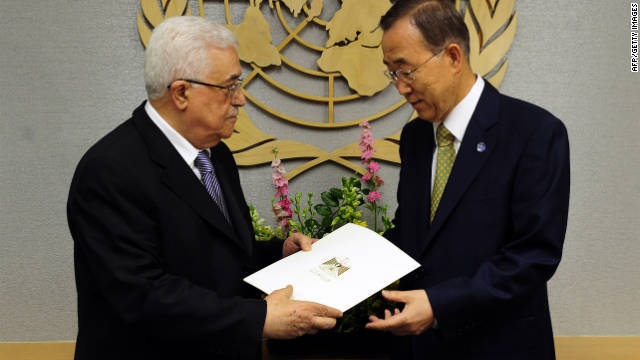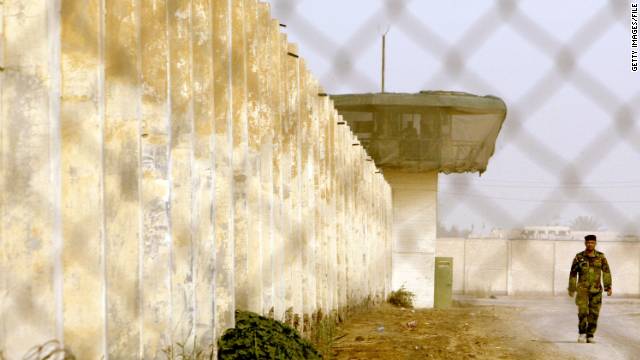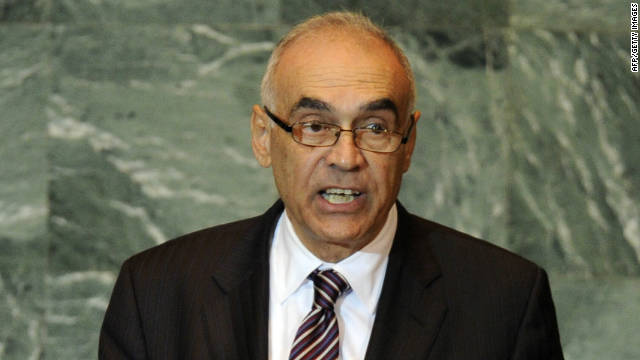
Palestinian President Mahmoud Abbas' ambitious push to gain full U.N. membership may seem unrealistic, but analysts say he is making hard-nosed calculations rooted in domestic politics.
"This is a move born of frustration," said Steven Cook, a senior fellow for Middle Eastern studies at the Council on Foreign Relations, referring to the consternation over dormant and deadlocked Israeli-Palestinian peace talks.
"Right now, he's thinking about his domestic political situation in order to maintain his position," Cook said. "So he's not eaten alive."
The United States has vowed to block a Palestinian membership application should it reach the U.N. Security Council.
The Palestinians' current U.N. status is as an observer "entity." Observers can speak in the General Assembly but not vote.
While a veto by the United States in the Security Council would block any effort to gain full U.N. membership, a "yes" vote in the General Assembly would raise Palestinians to the status of permanent observer "state," the status the Vatican currently holds.
A formal request for full U.N. membership is expected to be submitted Friday.
Cook says Abbas wins if he comes home with "something concrete" and "can turn lemons into lemonade."
"Whatever it is, he has to tell Palestinians something," be it the permanent observer status or even a cogent political narrative. An example would be that the Palestinians worked to get recognized but the United States and Israel blocked their "legitimate rights."
Salman Shaikh, director of the Brookings Doha Center and fellow at the Saban Center for Middle East Policy, said the effort surely plays out into the future legacy of the 76-year-old Abbas, a major player in the Palestinian political movement since the late 1950s.
"He is definitely committed to nonviolence and negotiations. That's been his mantra his whole life," Shaikh said. "He wants to leave with something."
But "this guy is still a very political guy" and his U.N. initiative, which comes after the popular demonstrations for democracy across the Middle East and North Africa popularly labeled the Arab Spring, has "galvanized" people, Shaikh said.
The effort has bolstered the standing of Abbas, who has been frustrated with the lack of progress in peacemaking and disappointed with the Obama administration.
"This has been a smart political move," Shaikh said. "What they are doing is they are effectively bringing an end to a U.S. monopoly on peacemaking. They are internationalizing it."
The Palestinians realize Obama is facing tough circumstances. They cite domestic political obstacles and believe that the U.S. president won't push Israeli Prime Minister Benjamin Netanyahu into the hard deal-making that is needed.
The Palestinians' instincts are still to let the United States lead negotiations, but "they don't believe it will happen."
In a Brookings article published Wednesday, Shaikh said the decision to approach to the U.N. Security Council "with the backing of the Arab League and regional power, Turkey, will start a high-stakes game of diplomatic brinksmanship."
But it is unclear how things will work out, he wrote.
One factor would be the fallout from an American veto in the Security Council -- a move widely seen as unpopular across the Middle East and one the United States would like to avoid.
"Contrary to conventional wisdom," a Security Council move "may not lead to a quick vote in September, " Shaikh wrote.
"Instead, the presidency of the Council will likely pass on the request to a 'Committee on the Admission of New Members,' which comprises all 15 members of the Security Council. While "death by U.N. committee' is a plausible scenario, more likely is a vote in the Council after weeks if not months of deliberations," he wrote.
If there is a U.S. veto, the Palestinians have other moves they could make. One is calling a "special vote of the U.N. General Assembly under the 'Uniting for Peace' resolution."
"In this case, a two-thirds majority of U.N. Member States could override the U.S. veto in the Security Council. Another option would be to return, if necessary repeatedly, to the Security Council. Bottom line is that this issue is likely to run and run," Shaikh wrote.
Haim Malka, deputy director and senior fellow in the Middle East Program at the Center for Strategic and International Studies, said Abbas doesn't have much to lose at this point.
Malka pointed to Palestinian failures, such as the policy to reconcile with Hamas, the militant movement that controls the Palestinian territory of Gaza, and efforts to force concessions from Israel. Also, he has lost faith that the United States can mediate a negotiated settlement with Israel. Fatah, Abbas' group and Hamas' rival, prevails in the Palestinian West Bank.
"While he's been relatively successful overseeing stabilization and institution-building in the West Bank, he's made no headway on his two most important objectives: reconciling Gaza and the West Bank and negotiating an agreement with Israel," Malka said.
The U.N. strategy gives him "a chance to hit Israel diplomatically, but "any satisfaction that comes from a new status at the U.N. will likely be short-lived and could actually undermine Palestinian efforts to negotiate an agreement with Israel in the future."
If the Palestinians gain non-member state status through the U.N. General Assembly, Palestinians will have the right to bring legal action against current and former Israeli officials in the International Criminal Court. That could lead to an "avalanche" of court cases against Israelis, along with diplomatic harassment, which would deepen Israel's isolation, Malka said.
David Makovsky, a senior fellow at the Washington Institute for Near East Policy and director of its project on the Middle East peace process, said several factors are motivating Abbas.
"He has been in search of a legacy. He is someone who would like to tell his people that he has brought his cause to the leaders of the world. He has put this issue on the agenda in a way that cannot be ignored."
Makovsky said Abbas is looking for a "political masterstroke" that would capture the imagination of the Palestinians and Arab people.
He wants to show that he is "in sync with the times, that there has to be some public manifestation of his diplomatic efforts."
"It cannot just be negotiations, but an assertion of Palestinian will that all can see. It has to be dramatic, as these are dramatic times."
Citing a "plethora" of recent Palestinian polling, Makovsky said most Palestinians wanted Abbas to go to the United Nations, even though most Palestinians thought it wouldn't work.
"Defiance has sometimes been more important than success," he said.






